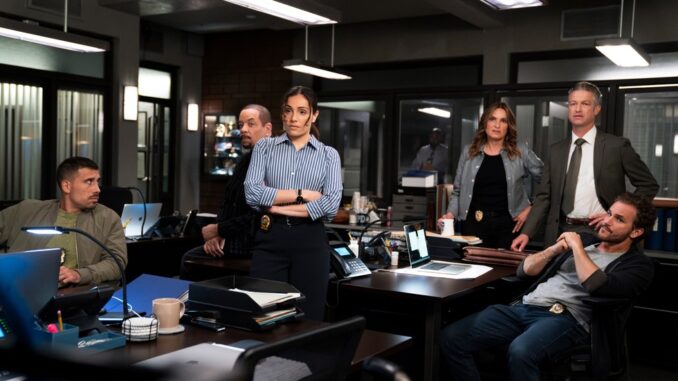
The Unforeseen Jolt: SVU's Recent Riptides of Revelation
For a quarter-century, Law & Order: Special Victims Unit has anchored itself in the bedrock of procedural drama: ripped-from-the-headlines cases, a steadfast dedication to justice, and a core team battling the darkest corners of humanity. Yet, to maintain its magnetic pull over such an extended run, SVU has proven adept at more than just its weekly formula. It thrives on the unforeseen, the sudden narrative seismic shifts that not only challenge its beloved characters but also send shockwaves through its loyal viewership. In recent seasons, as the show has deepened its mythology and its characters' personal lives, some of its most shocking plot twists have demonstrated a willingness to subvert expectations, deepen moral ambiguities, and redefine the very fabric of the squad.
Perhaps the most ethically thorny and emotionally jarring twist in recent memory arrived with the return of Rafael Barba, the beloved former ADA, only for him to defend the irredeemable Richard Wheatley – a man responsible for the murder of Elliot Stabler's wife, Kathy. This wasn't merely a cameo; it was a devastating betrayal of viewer expectations and a profound test of character loyalty. Barba, once the embodiment of legal righteousness for the victims, chose to represent their oppressor, citing the principles of a fair trial. The shock wasn't just in the act itself, but in the ensuing emotional fallout. Olivia Benson, his long-time confidante, felt a profound sense of abandonment and confusion, her trust in a friend shattered. Stabler's rage was palpable, a visceral reaction to seeing the man who destroyed his family given a voice by someone he once respected. This twist forced audiences to confront uncomfortable questions about justice, legal ethics, and the fine line between defending a client and condoning their actions, painting a morally grey area where SVU often prefers stark black and white. It left viewers reeling, questioning the very moral compass of a character they had come to revere.
Equally, if not more, impactful for the decades-long fanbase was the agonizingly prolonged "will-they-won't-they" between Olivia Benson and Elliot Stabler, culminating in a series of tantalizing near-misses and revelations. While Stabler's return in Organized Crime promised a rekindling, the true plot twist came not in a grand declaration, but in a moment of devastating vulnerability and a shocking epistolary confession. Following a therapy session, the palpable tension between them culminated in an almost-kiss that hung heavy with years of unspoken longing, only for Benson to pull away, fearing the risk. The subsequent revelation of Stabler's letter, penned during his undercover work, detailing his profound love for Benson and his inability to express it, was a gut punch. This wasn't just a declaration; it was a twist of the knife, revealing that the feelings were mutual, deep, and had been there all along, but circumstances – and their own fears – had conspired against them. The shock lay not in the existence of their feelings, but in the confirmation of their depth and the implication that they were always meant to be, yet consistently derailed. It transformed the "will-they-won't-they" into a heartbreaking "could-have-been," adding layers of longing and regret to their already complex dynamic, leaving the audience breathless with anticipation for a resolution that remains frustratingly out of reach.
Finally, the departure of Amanda Rollins, a character who had grown from a reckless Southerner with a gambling problem into a stable, empathetic detective and beloved wife to Carisi, offered a twist that defied the usual dramatic exits. SVU characters rarely leave for happy endings; they are usually killed, disgraced, or simply disappear. Rollins's decision to leave the squad to become a forensic psychology professor, immediately followed by her marriage to Carisi, was a shocking subversion of this grim tradition. The twist wasn't a death or a scandal, but a choice for personal growth and happiness outside the precinct's intense demands. It was jarring precisely because it was so normal and positive, yet it fundamentally altered the squad's dynamic. The shock stemmed from the unexpectedness of a core character choosing a life beyond the constant trauma of SVU, and the show's willingness to let her walk away into a future of relative peace. It left a palpable void in the team, forcing Benson to restructure her department and the audience to grapple with the departure of a character they had seen evolve so profoundly.
In conclusion, Law & Order: SVU's enduring appeal in recent seasons stems not just from its consistent portrayal of justice, but from its daring to occasionally shatter its own established norms. The shocking twists of Barba's controversial defense, the agonizing revelation of Benson and Stabler's true feelings, and Rollins's surprisingly peaceful departure are more than mere plot devices. They are illustrative narrative currents that demonstrate the show's vitality, its willingness to delve into moral ambiguity, its mastery of long-form character arcs, and its courage to evolve beyond its procedural shell. These moments, like sudden eddies in a seemingly predictable river, prove that even after a quarter-century, SVU retains its power to jolt, surprise, and leave its audience eagerly awaiting the next unforeseen revelation.
